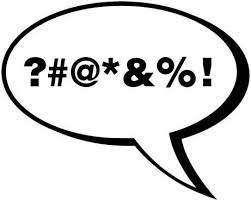Curse this Article!
February 2, 2017
I’m sure everyone does it.
Actually, I know we’ve all done it! We’ve all been there before. You stub your toe or run into a piece of furniture and it just slips out. That inevitable curse word!
The occasional curse word was once thought to be a sign of a lack of intelligence and grace, but now it is becoming more and more accepted in all environments from workplaces, classrooms, to colleges.
Swearing is mostly acceptable when some form of pain is involved. To swear under such conditions allows a way for people to express emotions that simply cannot be conveyed through regular speech. It is believed that swearing allows people to deal with pain. In a study done by Dr. Richard Stevens, he found that those who swore while dealing with pain could tolerate the pain for longer periods of time than those who would not swear. While this circumstance may explain a benefit for cursing, the real question to ask ourselves is when and where is it okay to swear.
Injecting curse words into normal conversations have become the new way of talking among many people, especially teens. The usage of “inappropriate” language and word choices have soared over the years because people are surrounded by curse words everyday from TV shows, movies, music, and so on. Cursing has become the way to express and emphasize thoughts and feelings.
But where do we, as a society, draw a line? Society should be able to recognize when a situation does not allow for the use of curse words such as in the classroom, yet they are still heard. Once asked, a fellow student said that he believes what dictates the need would be whether or not you’re supposed to respect others around you, specifically teachers. He thought that it was considered rude to cuss in front of teachers or adults in general.
Ms. Latta, our learning director agreed with this. She commented that she hasn’t really had to handle student discipline for cussing because most of these issues are handled in the classroom by the individual teacher. For example, Mr. Borelli has his students do 25 push-ups for every curse word he catches. He says, “I feel teachers have to do more than teach our subject. We must demand respect which in turn the students learn, appreciate, and will hopefully always remember as they become men and women.”
Latta also explained to me that when she overhears students cursing outside of the classroom or on the quad, she doesn’t pay attention. “It’s the students’ free time, there’s no need for me to interrupt their conversations with their friends. Unless they’re being excessively loud and obnoxious.”
Some teachers, however, don’t mind if there is profanity used within their classroom. One teacher explained that though he believes cursing isn’t necessary, it’s not exactly immoral as some believe. He does draw the line at racial or sexual slurs, which is totally understandable as these are some of the most offensive. He says that the ultimate reason that curse words are allowed in his classroom is that the words have been given a negative connotation, and they are simply just words like all others.
In a student poll ran on social media, fifty-four percent of the voters believe that cursing should be considered acceptable within the workplace and in school zones. However, in another poll, seventy-one percent of the voters believe that their profanity is excessive, and that they curse too much.
So for those of you that find yourself allowing such profanity to slip out in uncalled for situations, try to hold back the use for a while. This may allow the use of cursing more acceptable in the classroom or workplace as the use of it may become more understandable if it occurs in a called for situation. Also, you just might be able to deal with your next painful experiences a lot better than before.


Kassy M • Mar 5, 2017 at 6:41 pm
I really liked this article because it was relatable. I agree we use cursing as a way to blow off steam when we’re mad or get hurt. I also agree that there are certain places and times when we shouldn’t curse. Good article.
Vivian Grado • Mar 3, 2017 at 10:49 am
This article is so helpful. Thanks for taking the time and writing this out. I feel that cursing is just a way of life, we all do it, and to an extent, it should be allowed. This was definitely an article worth reading.